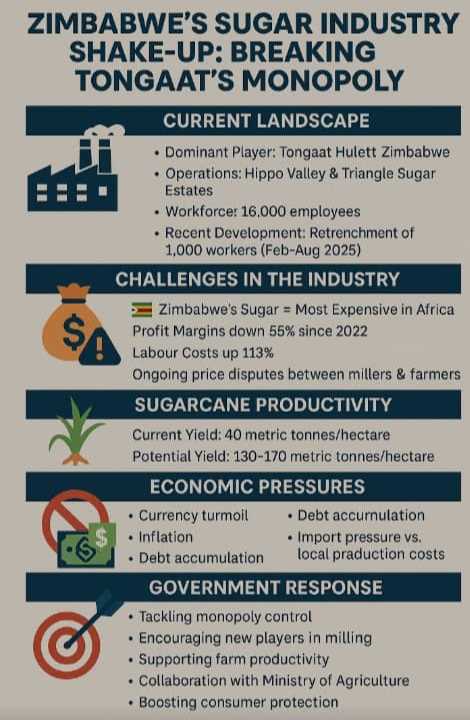
Nyashadzashe Ndoro- Chief Reporter
The Zimbabwean government has expressed intentions to introduce more players into the sugar milling industry, stating that the country "cannot continue to rely on one company."
This announcement follows reports that Tongaat Hulett Zimbabwe—the dominant sugar producer operating Hippo Valley Estates and Triangle Sugar Estates—is retrenching 1,000 employees, with over 100 already laid off.
Tongaat Hulett is one of Zimbabwe's largest employers, with a workforce of 16,000.
Speaking in Parliament, Minister of Industry and Commerce Mangaliso Ndlovu outlined the government’s plans to shield the local sugar industry from cheap imports. He acknowledged the sector’s vital role in the economy and detailed interventions including allowing sugar imports for blending by exporting companies, strengthening anti-smuggling efforts, and promoting local content. However, he also emphasised the need to improve competitiveness and address monopolistic tendencies.
Responding to a question regarding Tongaat Hulett’s retrenchments and the high cost of production, Minister Ndlovu said cheap imports had not been cited by the company as the main cause of the layoffs during discussions with the government. He confirmed that Tongaat had raised concerns about the recent 20% import threshold but pointed out that Zimbabwean sugar remains the most expensive on the continent, which negatively affects the competitiveness of export-oriented companies.
The Minister emphasized the need to support local sugarcane farmers in boosting productivity. Currently, the average yield stands at 40 metric tonnes per hectare, far below the potential 130 to 170 metric tonnes. He also noted an ongoing dispute between the miller and farmers over purchase prices, where farmers are demanding higher payments due to low productivity—contributing further to the high cost of local sugar.
“Indeed, they have highlighted that they have reservations about the 20% threshold that the government came up with, but we have had discussions with them because, again, as a country, our sugar is the most expensive on the continent. Exporting companies face increased costs, reducing their competitiveness,” said Minister Ndlovu.
“Mr. Speaker Sir, as I highlighted in my earlier response, there are a number of issues that need to be addressed in the sector. Among these interventions is the introduction of other players in the milling industry. We cannot continue to rely on one company.”
Related Stories
“Secondly, we need to support our farmers to be more productive. As we speak, before me is a dispute between the miller and the farmer over a purchase price agreement. The farmer wants to push the price up because they are not productive. Raising prices under such conditions means our sugar remains expensive. Then they want the government to ban imports—what remains are high sugar prices for local consumers.”
He further stated that the Ministry is working closely with the Ministry of Lands, Agriculture, Fisheries, Water and Rural Resettlement to address agronomic challenges and improve sugarcane yields.
Minister Ndlovu said the government is developing a comprehensive plan, in collaboration with the Ministry of Agriculture, that prioritizes increased farmer productivity as a long-term strategy to ensure the growth and competitiveness of the local sugar industry—while also taking consumer interests into account.
In January, Tongaat Hulett spokesperson Dahlia Garwe told Reuters that the retrenchment of 1,000 employees—500 from each of its Hippo Valley and Triangle mills—would take place in three phases between February and August.
The layoffs were attributed to the company’s efforts to cut costs amid currency instability and inflationary pressures, which have eroded profit margins and pushed up labour expenses.
“It is very difficult to manage such a large workforce, so we need to look at ways and means of becoming a lot more efficient in how we do our business,” Garwe said.
“This is part of a strategy to bring our costs under control and put the company on an even path.”
The company has suffered a 55% decline in profit margins since 2022, while labour costs have surged by 113%, leading to mounting debt.
Tongaat Hulett Zimbabwe is also in the process of being sold to a Mauritius-registered investment company.



















Leave Comments